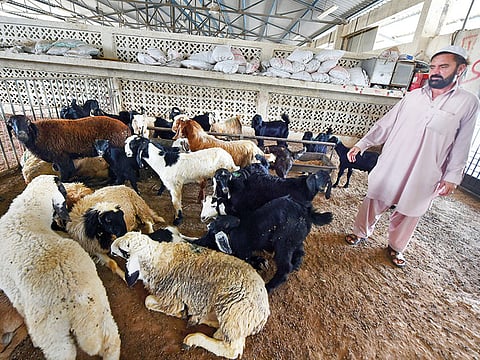Livestock prices may jump slightly during Eid, say traders
Prices may go up by Dh20 to Dh50 per animal because of high demand

Abu Dhabi: Prices of livestock may witness a slight increase at the Abu Dhabi Livestock Market in Mina Zayed during the Eid Al Fitr celebrations when the demand for meat products spikes.
Animal traders at the market said natural market conditions during Eid see prices of animals go up between Dh20 and Dh50 per animal because of the high demand on the Eid day, whereas in Ramadan, prices mostly remained stable.
More than two dozen animal outlets are squarely lined up at Mina and traders sit on chairs calling each passing motorist to come and see the better breeds with best prices.
Gulf News visited the animal market of Mina Zayed in the capital to check on the livestock and prices.
Traders ruled out any shortage this Eid.
They said there will be sufficient supply to meet consumer demand despite animals not coming for years from Somalia and Iran.
Speaking to Gulf News, Gul Nawab Khan, a trader at the Florida Trading Establishment of the market, said, “We can’t say there is supply shortage but imports of goats from India have thinned. Prices of goats may witness a slight increase — Dh20 to Dh50 per goat — during Eid. But no major change in the prices.
“Two-and-a-half months from June 14, there will be no imports of animals from India by ship due to the scorching heat. Each year, imports get temporarily stopped in summer season because of loss of animals on long ship journeys.”
Currently, the Indian Kashmiri sheep of 10 kilograms (small) is priced at Dh450 in the market and Kashmiri lamb of 20 kilograms (big) is priced at Dh700.
There are two local breeds available in the market, Naeemi and Najdi goats, mostly preferred by Emiratis.
Naeemi and Najdi of 12kg to 15kg are priced in the market between Dh750 and Dh850 a goat. If the weight of the goat is more, prices may increase accordingly.
Another trader, Nadir Khan at Bou Ataba Livestock, said: “Currently, supply of Indian and local breeds is good; there is no shortage in the market. Because of Eid, prices may go up a little bit but there will be no significant rise this Eid.”
It’s good that Eid will fall this year just before the closure of animal shipments in summer from India, said Khan, 42, who has been in the livestock business for 12 years.
He clarified that animals die during the voyage from India to the UAE because of the scorching heat that’s why big traders stop importing them for a few months from mid-June each year.
Consumers at the market expressed satisfaction about the prices of goats in Ramadan and hoped that it would remain the same during Eid, too.
Ahmad Abdullah, an Emirati who came to the livestock market to buy local Najdi sheep, said, “I have purchased sheep in Ramadan and will be purchasing for Eid too. I haven’t seen any rise in prices of animals lately. It’s normal nowadays.”
The market also offers residents a place for a good bargain and allows buyers to select the animal from the barn.
“I am looking for Najdi and Naeemi sheep and bargaining,” he said adding “they are asking for Dh750 for a Najdi but I offered them Dh600. Let’s see what happens,” Abdullah said.
Daulat Khan, a trader in the market for 23 years, said: “If the supply remains as usual, the prices of goat will remain the same or may jump by Dh20 to Dh50 per goat.”


